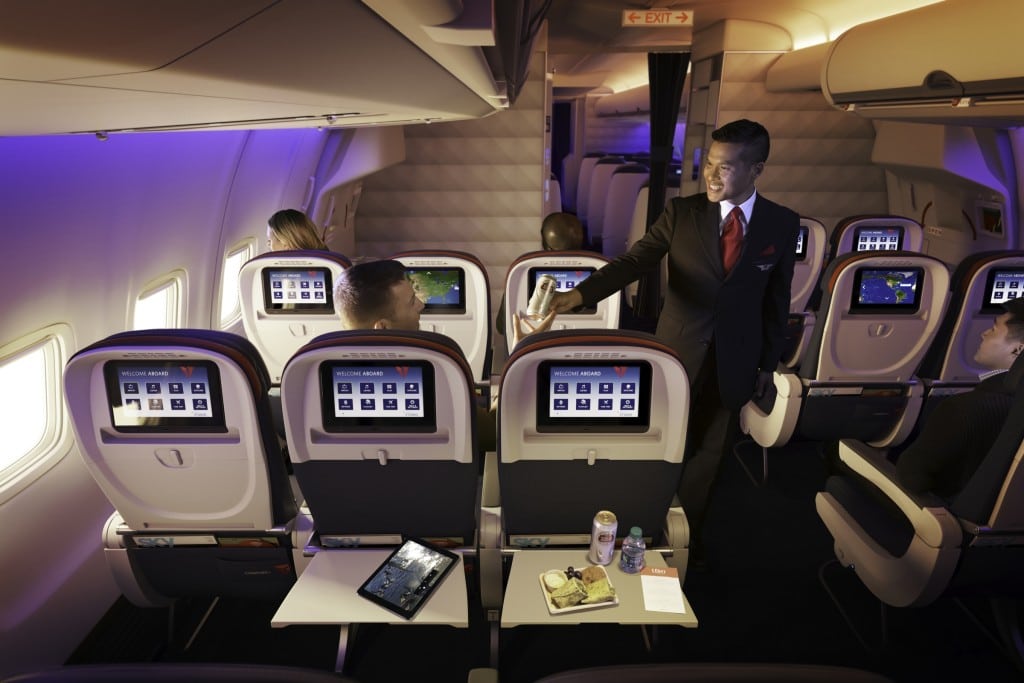Skift Take
Airlines remain highly profitable, but there are signs U.S. carriers may be expanding too much. We'll find out soon whether other carriers will follow Delta's lead and moderate their growth.
Delta Air Lines will curb its domestic growth starting in late August as it seeks to increase revenue and ensure business travelers booking at the last minute pay more for tickets.
The decision, announced Thursday on the carrier’s second quarter earnings call, comes as Delta and its competitors continue to report lower year-over-year revenue per available seat mile, an industry metric measuring how much money a carrier makes for each mile it flies. Delta’s passenger revenue per available seat mile, or PRASM, decreased 4.9% compared to the second quarter of 2015. The airline predicted third quarter unit revenues will decrease 4 to 6 percent, also year-over-year.
As it seeks to improve its performance, Delta said it will reduce domestic capacity by three percentage points by the fourth quarter, compared to today. The airline did not say how it would do so, or whether it might cut some underperforming cities from its network.
“Domestic capacity is coming down significantly,” Delta President Glen Hauenstein said.
Delta also will make cuts to its international schedule, reducing capacity to the United Kingdom, mainly to cities outside of London, such as Manchester. The United Kingdom’s recent decision to leave the European Union has not affected demand from U.S. travelers, the airline said, but it has resulted in fewer Britons buying tickets to travel to the United States. By next winter, Delta will reduce its U.K capacity by 6 percentage points.
CORPORATE YIELDS SUFFERING
While overall unit revenues have been falling for several quarters, airlines have mostly avoided making substantial trims to domestic flights, as U.S. passengers have been among their most profitable. But increasingly, larger airlines have been forced to discount domestic tickets, not always for leisure travelers who book in advance, but for business travelers, who historically have paid sky-high prices to fly at the last minute.
Hauenstein said many corporate travelers have been paying “stubbornly low business fares” mainly sold within one month of travel. He said the relative weakness of that side of the business came as a surprise to Delta.
“The demand for leisure is quite good, and in demand with our capacity offering,” Hauenstein said. “But it has not offset the close-in [corporate] yield weakness that we see. That leaves us with no other choice but to decrease the capacity levels moving forward.”
Several factors are affecting close-in prices. In many markets, airlines have removed advanced purchase rules and Saturday-night stay requirements, allowing business travelers to buy fares that otherwise may have been set aside for leisure travelers. Also, major airlines are now competing more forcefully with discounters like Frontier Airlines and Spirit Airlines, who do not raise their ticket prices as much in the weeks before departure.
“Business fares are all below where they have been historically,” Hauenstein said. Over time, he said, Delta wants to ensure business travelers once again pay a premium for the most convenient flights.
“It’s the way you are approaching the time value for time-sensitive travelers,” Hauenstein said. “Are you getting what people would be willing to pay for their time, versus what the market is charging for their time?”
BUSINESS STILL GOOD
Still, Delta executives stressed business remains strong. The airline reported adjusted pre-tax income of $1.7 billion, an increase of $42 million compared to the second quarter of 2015.
“It will be an incredibly profitable summer for us,” Hauenstein said. “It’s not as disastrous as some people are characterizing it. It is really robust, and we are going to take the necessary actions to fix it moving forward.”
Delta said it is achieving success with initiatives aimed at increasing ancillary revenues.
It said total merchandising revenues for the quarter increased more than $40 million, or 13 percent, year-over-year. One bright-spot was the airline’s Comfort + cabin, which offers passengers additional legroom and some perks, including free alcoholic drinks. Paid load factor in the cabin increased by 15 points to 46 percent. Delta said it expects the cabin to generate nearly $300 million of up-sell revenue in the second half of this year.
The Daily Newsletter
Our daily coverage of the global travel industry. Written by editors and analysts from across Skift’s brands.
Have a confidential tip for Skift? Get in touch
Tags: delta air lines
Photo credit: Delta's Comfort + cabin is performing well, but the airline will still slow its growth later this year. Delta Air Lines
